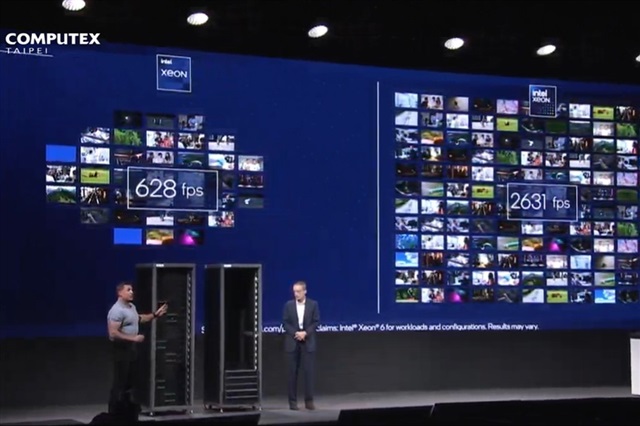Confidently taking the stage at Computex Taiwan 2024, "the heartland of the ecosystem," Intel CEO Pat Gelsinger took a famous quote from Gordon Moore and added onto it by telling the audience, "Everything that has been done, will be outdone," and demonstrated the performance, power efficiency, and cost advantages of Intel's architectures and products in comparison to competitors.
Just like all the competitors that have already done their keynote speeches, Intel made an all-out effort to show its readiness for the "AI PC Moment", but Gelsinger specifically points out that Intel is the only company that gets to service 100% of the AI continuum from semiconductors to service and products spanning from IC foundry, data centers, edge & enterprise, and AI PCs.
Gelsinger is especially proud of the outstanding design capability of the company, exemplified in Lunar Lake's revolutionary architecture, and new IP blocks for CPU, GPU, and NPU. "It'll power the largest number of next-gen AI PCs in the industry."
CPU x GPU x NPU
Gelsinger refuted competitor comments saying their products' performance and power efficiency are better than X86 architecture. "Lunar Lake running in our labs today outperforms the X elite on the CPU, on the GPU, and on AI performance, delivering a stunning 120 TOPS of total platform performance," said Gelsinger.
He went on to say, "The final nail in the coffin of this discussion is some say the x86 can't win on power efficiency. Lunar Lake busts this myth as well. This radical new SOC architecture and design delivers unprecedented power efficiency, up to 40% lower SoC power consumption than Meteor Lake, which was already very good."
Yet Gelsinger did not forget to credit TSMC, the critical partner, for helping Intel with many of the core technologies required to make Lunar Lake possible. Intel and TSMC's collaboration went beyond Lunar Lake, which enables AI PCs that are to be shipped in the third quarter of 2024, but also enables Universal Chiplet Interconnect Express (UCIe) standards, which is co-developed by AMD, Arm, ASE Group, Google Cloud, Intel, Meta, Microsoft, Qualcomm, Samsung, and TSMC.
Intel boasts more than 500 AI models optimized for Core Ultra to be operated on AI PCs. In addition to the features mentioned before, Gelsinger emphasized Lunar Lake's superiority such as 50% better graphics performance, 4X NPU AI compute, and 3.5X GPU AI compute than previous generation products.
During the keynote, when explaining the multi-modal application made by Generative AI and Retrieval-Augmented Generation (RAG) to the user experience from "search" to "ask," a staff "accidentally" asked the price of Intel's Gaudi 2 & 3 AI kits. To prevent the price tags from being made public, Gelsinger asked the computer to show how that compare to other competitors.
The result shows Gaudi 2 was 1/3 and Gaudi 3 is 2/3 of that of competitors. Gelsinger claimed Gaudi 3 is 40% faster to train GPT3 (175 billion parameters) versus Nvidia's H100 8192 accelerator, 15% faster inference throughput than H100 64 for Llama2 (70 billion parameters), and 2X faster inferencing on average compared with H100.
As for data centers, the speed and efficiency of new-generation Xeon processors are also presented on stage to show the advance in performance compared to the previous generation.
Incumbent vs. new entrants
As the incumbent, Intel not only faces challenges from AMD from the X86 camp but also getting pressure from new rivals such as ARM and Qualcomm, who are expanding their frontiers on the turf that used to be dominated by Intel.
Qualcomm CEO Cristiano Amon's keynote on the "PC Reborn" the day before showed that Qualcomm is gearing up for PC sales to make a comeback with its Snapdragon X series processors, which will power new AI PC models set to hit market shelves in mid-June.
Arm CEO Rene Haas also predicted that by the end of 2025, there will be 100 billion Arm devices worldwide, ushering in the AI era.
Intel did not mention those new entrants, but instead focused on the opportunities. Gelsinger said more than 8 million units of AI PCs have been shipped to date, and predicts 40 million units of AI PCs will be shipped by the end of 2024.
Although Intel also showed that key AI PC players including Microsoft, Asus, Acer, and Inventec are behind its back, while Quanta Cloud Technology (QCT), Wistron, Wiwynn, Dell, Supermicro, Lenovo, and Foxconn are also supporting Intel's product lines, they are also the supply chain partners of other competitors.
To differentiate from Nvidia's proprietary walled garden strategy, Intel, echoing AMD's Lisa Su, highlighted the open innovation standards of the Ultra Ethernet Consortium (UEC) and the UA Link, as Intel and AMD are both members of the consortium.
On the note regarding 18A as the 5th node in 4 years that Gelsinger vowed to achieve for Intel Foundry to catch up, he also unveiled that the next-generation architecture Panther Lake will be manufactured by 18A process wafers to "bring process leadership back to Intel where it belongs."
Gelsinger announced that he will be back in Taiwan next year to host a 40th-anniversary party celebrating Intel's presence in Taiwan at Computex 2025, and Panther Lake is almost certainly to become the center of its pride.

Credit: DIGITIMES



